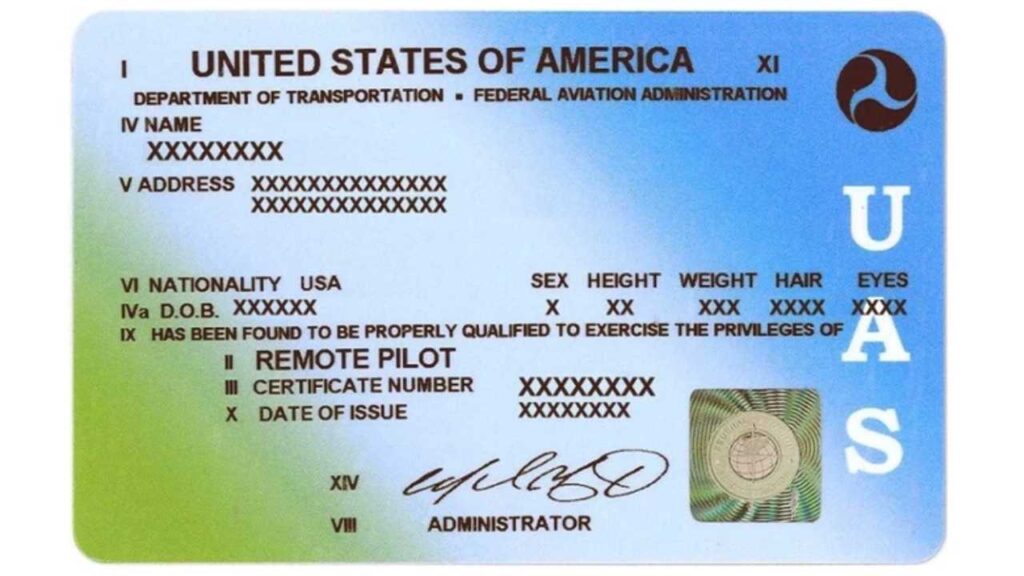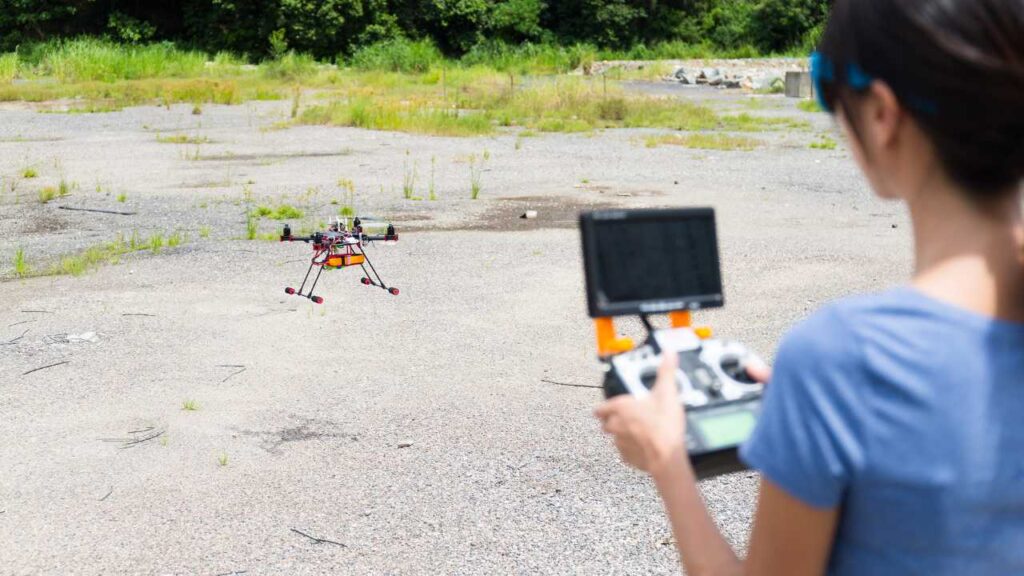
If you’ve already gained some experience in drone piloting and have posted some amazing footage or photos on social media, you may already be receiving some job invitations from others.
Maybe it’s your friend asking you for the favour of filming an event. Maybe it’s a marketing agency asking for permission to use your footage for promotional purposes.
Now it’s time to take the next step – get a drone pilot license! But how to get a drone license?
Drone flying is a lucrative and up-and-coming industry, and certification is your first step to begin this exciting journey. Even if you don’t aim to make big money from it, flying for non-recreational purposes requires a license according to the FAA.
There is so much outdated information on the internet that does not reflect the latest FAA requirements. So I’ve fully refreshed this guide in 2024 to show you how to get your drone license without spending money unnecessarily.
Table of Contents
#1 Do You Need a Drone License?
If you fly drones for recreational purposes (for fun) and not for money, you don’t need a drone license. But you must take The Recreational UAS Safety Test (TRUST) online, which is free and not too hard. All test providers offer study materials. Visit this FAA’s official webpage for details. If you want to skip all the searches and go straightaway to the best TRUST course and test, I’d recommend the Drone Pilot Ground School.
If you fly a drone for non-recreational purposes (not for fun), you need a Remote Pilot Certificate from the Federal Aviation Administration (FAA). It’s also known as the Part 107 license, Part 107 certificate, or Remote Pilot license. They are all the same thing.
Part 107 is the set of rules for commercial drone use that the FAA introduced in 2016. If you’re using a drone for fun, you’re partly exempt from Part 107 and only need to take TRUST.
But if it’s for work, you have to register your drone, follow Part 107 rules, and get a Part 107 certificate, which is like a drone license.
What is Non-Recreational?
The FAA defines non-recreational use very broadly. You can fall into this category even if you are not flying a drone for the money. The FAA looks at whether your intent of the flight is non-recreational.
According to the FAA website, using a drone to take pictures for personal use is considered recreational use. But if you are using the drone to take photos or videos for compensation, it is considered commercial.
The above is pretty obvious. But the FAA gave another example in a 2019 webinar. It might surprise you. It said that checking your gutters with your drone would require a drone license. It is because the intent of the flight was not to have fun. Another example being taking pictures of a high school football game for the school’s website, or volunteering to use your drone to survey coastlines on behalf of a non-profit organization.
#2 Get a Drone License with 4 Steps
- First, make sure you meet the following criteria:
- Be at least 16 years old.
- Be able to read, write, understand and speak English.
- Be physically and mentally fit to fly a drone.
- Set up an account on the FAA’s IACRA system so that you are able to schedule the exam.
- You can choose a knowledge testing centre from nearly 800 locations across the US. Then you’ll need to take the written exam in person. You can find a list of testing centres here.
- You must answer at least 42 out of 60, which is equivalent to 70% of the questions correctly to pass the exam. If you make it through, congratulations! The testing centre will give you a form to apply for your drone license with IACRA.

#3 What Is the FAA Drone Test All About?
If you expect the test requires you to get out your drone and show off some important skills in front of an examiner, you’re wrong. The test is purely a written test.
The FAA test consists of 60 multiple-choice questions. You will have to answer these within 2 hours at your chosen testing centre.
Although you can complete the entire application process online, you cannot take the exam remotely. You must take it in person at a centre.
You must score 70% or higher to pass. There are more than 120 concepts in the UAS Airman Certification Standards. The following are some key topics:
- FAA Drone Laws
- National Airspace System (NAS)
- Reading Sectional Charts
- Airport Operations
- Weather & Micrometeorology
- Flying a Drone at Night
- sUAS Loading and Performance
- Emergency Procedures
- Crew Resource Management
- Radio Communications
- Effects of Drugs and Alcohol
- Aeronautical Decision-Making
How to Study the FAA Drone Test?
The above topics sound overwhelming, but most people make it through on their first try. The FAA recommends 20 hours of study. Generally, you spend about 2 to 3 weeks studying for an hour a day to prepare.
Many candidates choose to take an online course to prepare. This way, they save themselves a lot of hassle searching for materials and paper exercises. You’ll build a routine to study for the exam. You’ll get plenty of practical tips to boost your confidence before you step onto the exam floor. These come with a cost – the tuition.
We have already put together the best online drone schools on the market here. Check it out as there are a lot of free resources you can explore as well!
If you’re self-disciplined and can find materials online, or have a friend with a drone license to help you study, you can prepare for the exam on your own. The FAA provides a free 88-page study guide. Keep in mind that just browsing through the pages can be overwhelming 😅.
How Long Does It Take to Get a Drone License?
Typically, you spend 4 to 6 weeks to get your FAA drone license, from exam preparation to application to passing the exam.
After you have applied for the license on IACRA with a pass in the test, the FAA will send your information to the TSA for a background check. After a few days, the FAA will issue a temporary certificate allowing you to fly non-recreationally.
About 6 to 8 weeks later, you will receive a physical license card by post. You can show this to officials upon request and show it off to your friends too!
#4 How Much Does a Drone License Cost?
You have to pay three things to get your drone license – exam fee, course fee and registration fee.
Examination Fee
You need to pay $175 to the testing centre to take the exam. The testing fee is non-refundable. If you do not pass the exam, you will have to pay the full price to take the exam again. You are allowed to retake the exam after 14 days. There is no limit to the number of attempts you can make.
Fee for Exam Preparation
If you choose to enrol in a course beforehand, it usually costs between $150 and $300 depending on which school you choose.
They usually give students lifetime access to their online content. That means you pay a single fee to enjoy unlimited access to their materials, including the new content they upload in the future.
Some drone schools, like the Drone Pilot Ground School that I recommend, guarantee their students a pass. They promise a full refund of the exam fee if their students don’t pass on the first attempt. Yet, their course fees are usually more expensive.
If you decide not to take a course, you may need to buy some exercises or books from Amazon. They usually cost between $10 and $30.
Registration Fee
Besides the license fee, don’t forget to register your drone with the FAA DroneZone. This costs $5 per drone for 3 years. You can get all the information you need on drone registration here.
#5 How Long Is a Drone License Valid?
Technically, your drone license is valid forever unless it is revoked by the FAA. But you must renew it every 2 years by taking a free, 1-hour online course ALC-677 at the FAA’s official website. You cannot fly your drone if you haven’t done it when your license expires.
#6 If You Are a Part 61 Private Pilot
If you already hold a 14 CFR Part 61 pilot certificate, which allows you to fly an aircraft, you do not need to take an exam to fly under Part 107. You will need to complete the FAA’s online course, which will take up about two hours.
Besides, you will need to ensure that you have completed a flight review within the last 24 months.
#7 How Can You Make Money With a Drone License?

It’s no secret that prominent camera drone pilots make the big bucks. Some full-time, freelance drone pilots reportedly make 6 figures a year.
However, you won’t get that amount of money the moment you’ve secured your license. This was just a ticket to tap into this industry. There will be a long but exciting journey ahead to make real money.
Drones are being used in a growing number of industries. Here are a few examples:
- Filmmaking
- Real estate sales videos
- Monitoring construction progress
- Surveying of stockpiles
- Crime scene mapping
- Search and rescue
- Deliveries
- Response to natural disasters
- Settlement of insurance claims
- Infrastructure inspections (pipelines, bridges, railroads, utility towers)
How Much Money Do You Make as a Drone Pilot?
Generally, you can make between $35,000 and $80,000 per year for a full-time job as a drone pilot. If you work on a project basis, you can get $200 to $300 per project.
The most popular job is aerial photography or filming. There is also a growing demand for drone applications in many other industries.
For example, real estate agents routinely hire drone pilots to film high-end listings. Drones are used in construction for progress updates, mapping, and more. Many roofing companies use drones to quickly estimate roofs.
Insurance adjusters use drones frequently now. In addition, first responders like police and fire departments use drones to monitor situations. Utility companies use drones to inspect power lines.
#8 Do You Need Drone Insurance?
Drone insurance is not currently required by the FAA for either recreational or commercial drone use. Whether you should buy insurance depends on how much risk you’re taking. It can be a smart move, especially if you’re conducting business, flying on behalf of your company, or flying for some other kind of non-recreational purpose. Insurance can help cover the costs of potential accidents, personal injury, or property damage.
The cost of drone insurance can vary. Some insurance providers offer policies as low as $7 per hour to $350 per year for $1 million in liability coverage. Short-term coverage for hours or days is also available, which can be beneficial for drone pilots who don’t fly regularly.
Please note that costs are subject to change, so it’s always a good idea to check the information directly from your chosen insurance provider.
What to Do Next?
Not sure if you should take an online course? Wondering which drone school offers the best value for your money? Check out our guide to the Best Online Drone Schools to get an idea!
